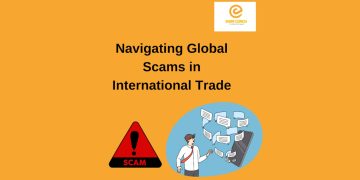Written by: Abhishek Srivastava (International Business Consultant), Founder – Exim Coach.
International trade has long been integral to global business, providing opportunities for growth and expansion beyond national borders. However, this landscape also presents risks, particularly from scammers targeting unsuspecting businesses. This article examines the Double A paper scam from Thailand, highlighting key warning signs and protective measures for those involved in import-export activities.
The Double A Paper Scam: An Overview
The Double A paper scam is a notable fraud targeting businesses through platforms like WhatsApp. Scammers impersonate legitimate suppliers of Double A brand A4 copier paper, a well-known product in Thailand used widely in office settings. They claim to be sales managers capable of supplying large quantities at significantly reduced prices, around $0.70 per ream, which is far below market value. This attractively low pricing is designed to lure unsuspecting buyers.
Deceptive Payment Terms
To further their scheme, scammers propose seemingly reasonable payment terms to build trust:
- 30% T/T Advance: This initial payment is said to cover operational costs such as packing, labeling, loading, phytosanitary tests, truck rentals for local transportation, and shipping to the port.
- 30% Against Bill of Lading: This payment is requested once the Bill of Lading and other shipping documents are issued.
- 40% Upon Arrival: The final payment is due upon the goods’ arrival and confirmation of quality.
Despite these structured terms, the scammers do not possess any actual goods or infrastructure. Once they receive the initial advance payment, they disappear, leaving the buyer with significant financial losses and no recourse.
Indicators of Authentic Suppliers
Genuine suppliers adhere to established business practices and communication channels. Critical distinctions between legitimate suppliers and scammers include:
- Professional Communication: Authentic suppliers use formal communication channels such as corporate emails and official websites, rather than informal platforms like WhatsApp.
- Letter of Credit (LC): Reputable suppliers are open to working with Letters of Credit, a secure payment method in international trade. Scammers typically avoid LC terms due to the rigorous verification and documentation processes involved.
- Verification of Documents: Genuine suppliers provide verifiable documents, including proforma invoices, Bills of Lading, passports, and registration numbers. Scammers produce counterfeit documents, which can be identified through diligent verification.
Protective Measures for Businesses
To safeguard against such scams, businesses should consider the following precautions:
- Conduct Due Diligence: Thoroughly research the supplier before entering any transaction. Verify their credentials, check for reviews or complaints, and confirm their legitimacy through official channels.
- Insist on Secure Payment Methods: Use secure payment methods such as Letters of Credit, which offer protection against fraud. Avoid making large advance payments, especially to unknown or unverifiable entities.
- Seek Legal Advice: Consult with a legal expert specializing in international trade to review contracts and payment terms. A lawyer can provide valuable insights and help identify potential red flags in the transaction.
- Verify Documentation: Carefully scrutinize all documents provided by the supplier. Use third-party verification services if necessary to ensure the authenticity of critical documents like Bills of Lading and proforma invoices.
- Establish Clear Communication: Maintain clear and documented communication with the supplier. Avoid informal communication platforms for official business transactions, as they lack the security and traceability required for resolving disputes.
Conclusion
While international trade offers significant benefits, it also exposes businesses to potential risks, including sophisticated scams. The Double A paper scam in Thailand exemplifies how fraudsters exploit the trust and expectations of global traders. By exercising due diligence, insisting on secure payment methods, seeking legal advice, verifying documentation, and maintaining clear communication, businesses can protect themselves from falling victim to such fraudulent schemes. Staying informed and vigilant is crucial in the ever-evolving landscape of global trade. Adhering to best practices and maintaining a proactive approach to risk management can help businesses navigate the complexities of international trade with confidence and security.
Contact Information:
Abhishek Srivastava (International Business Consultant)
Founder – Exim Coach
Email: info@eximcoach.com
Phone: +918874567555
Stay updated with the latest in supply chain news at The Supply Chain Report. For free international trade tools, visit ADAMftd.com.
#InternationalTrade #TradeScams #GlobalBusiness #ImportExportSafety #FraudPrevention















